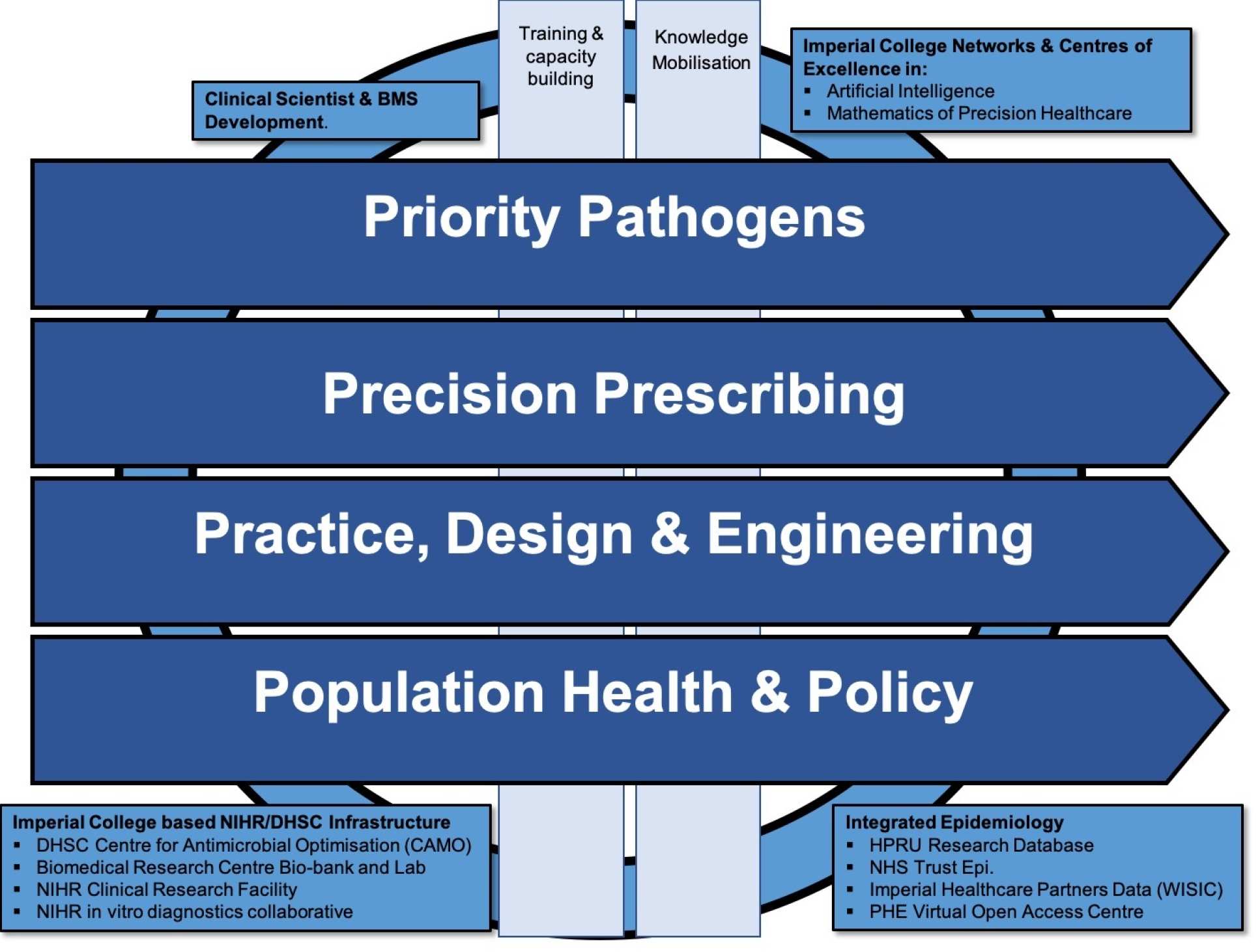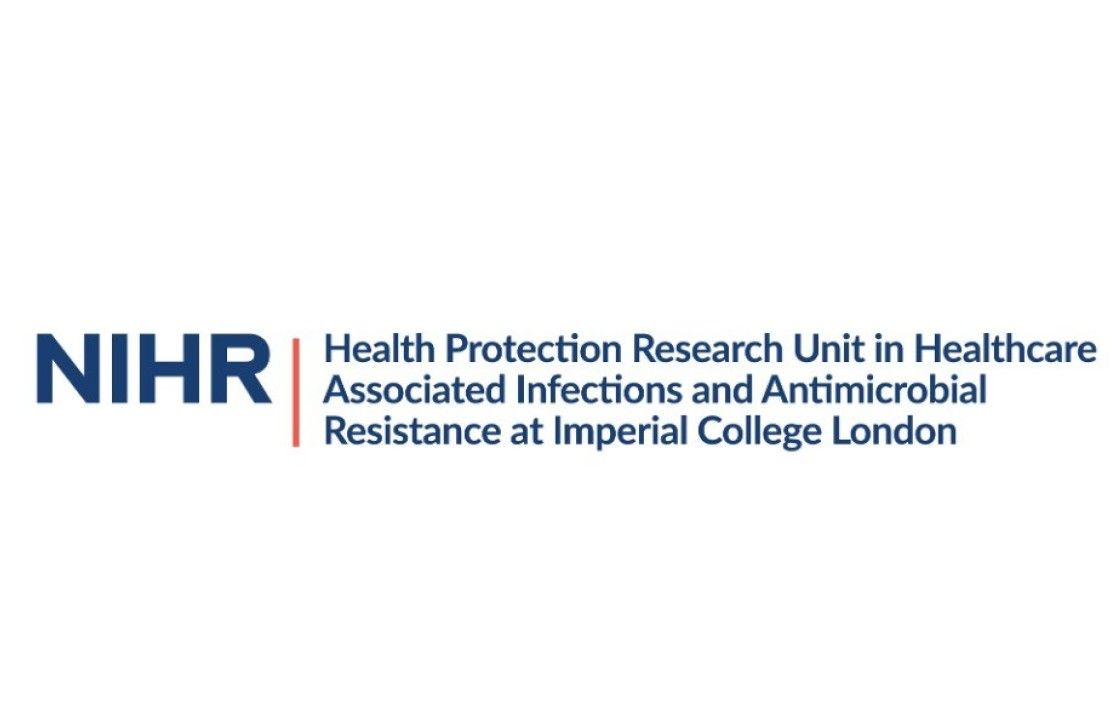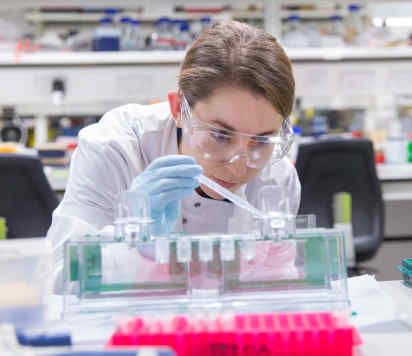Our HPRU in HCAI and AMR at Imperial College London aims to deliver applied research across four interlinked themes, guided by college leads from across disciplines and leads from UK-HSA. Our experienced team of researchers, including NHS-embedded staff and UK-HSA named researchers will ensure our work is grounded in the realities of clinical care and public health.

Expand the accordion below to find out more about each theme.
You can view a Year 1 combined theme update video here.
Research themes
Identified priority pathogens:
- carbapenemase producing organisms (CPOs)
- E.coli
- staphylococci
- Group A and Group B streptococci (particularly iGAS and iGBS)
We will link extensive experience of these organisms and expertise in molecular biology, clinical microbiology, mathematics, genomics and bioengineering, harnessing innovative applications of emerging technologies. Research is supported by the MRC Centre for Molecular Bacteriology and Infection, the Imperial Academic Health Science Network (AHSN), and one of UK’s largest Acute Trusts, offering biobanking facilities, cross-site microbial diagnostic services, an advanced data infrastructure and cutting edge applied research. Warwick and Cambridge Universities' genomic and epidemiological expertise will further strengthen and guide research.
We will focus on understanding
(i) risk factors and strains/resistance mechanisms of most concern,
(ii) transmission pathways within specific populations/settings,
(iii) currently unrecognised emerging or existing trends,
(iv) innovation for early detection and diagnostics, and
(v) optimal models for NHS adoption.
We will identify factors affecting emergence, evolution, transmission, acquisition, carriage, and pathogenesis of these organisms, to shape interventions, improve clinical management, and develop diagnostic workflows to optimise NHS impact. Translation of the developed technologies and outputs will be supported through existing HPRU regulatory and CE marking expertise.
Below, Research Lead Elita Jauneikaite provides an overview of the Priority Pathogens theme, including updates from Year 1.
Priority Pathogens - Year 1 update
Key contacts for the priority pathogens theme:
Lead: Ramesh Wigneshweraraj
Co-Lead: Shiranee Sriskandan
UK-HSA Lead: Colin Brown
NHS Lead: Frances Davies
Research Lead: Elita Jauneikaite
We will build on our existing unique collaboration of clinicians, bioengineers, chemists and pharmacologists nurtured within the existing HPRU. We aim to develop and investigate the role of novel, technological solutions which will drive a shift from one-size-fits-all approach towards individualised antibiotic prescribing. Our hypothesis is that the investigation and development of precision prescribing technologies will facilitate dynamic monitoring, and adaption of antibiotic delivery. This will improve antibiotic prescribing, individual outcomes, and preserve effectiveness of existing agents whilst reducing the negative consequences of antibiotic therapy on the individual and society.
Additionally, it will generate rich data to improve dosing recommendations, including those for treating HCAIs. We will build on current HPRU successes in linking technological development with world-leading research into co-design and targeted behaviour change. Research will be supported by the new DHSC Centre for Antimicrobial Optimisation (CAMO) at Imperial and a strategic alliance which will be developed with the University of Liverpool’s DHSC Centre for Individualised Antimicrobial Therapy. Our NIHR Clinical Research Facility will also support research, enabling the rapid delivery of outputs and exploitation of opportunities generated. We will also build on innovative biosensor technologies and our CE marked artificial intelligence decision support tools developed within the current HPRU. The main strategic focus will be exploring how biosensor technology and AI can be applied to pharmacokinetics (PK) and pharmacodynamics (PD) to personalise dosing and improve antimicrobial stewardship.
Below, Research Lead Tim Rawson provides an overview of the Precision Prescribing theme, including updates from Year 1.
Precision prescribing - Year 1 update
Key contacts for the precision prescribing theme:
Lead: Martin Wilkins
Co-Lead: Pantelis Georgiou
UK-HSA Lead: Matt Ellington
NHS Lead: Mark Gilchrist
Research Lead: Tim Rawson
For more information about this theme, please contact Dr Tim Rawson at timothy.rawson07@imperial.ac.uk.
The research will be building upon our existing HPRU 'Behaviour Change, Technology and Innovation’ theme. We will pursue evolving research on the development of bespoke stewardship and IPC solutions informed by social science/implementation research, and will be bringing in the unique skills of the Dyson School of Engineering and its links with the Royal College of Art. We will investigate the impact of healthcare provider decisions and healthcare user perceptions on AMR and IPC, and the potential benefits to patient safety across the healthcare economy in applying the principles of person-centred design and smart engineering to healthcare systems, pathways, data (e.g. data collection and visualisation) and the clinical working environment (e.g. surfaces, equipment, water). In line with the NHS patient safety strategy (2019), it will bring together patient safety, IPC and antimicrobial stewardship (AMS) under one overarching research and implementation strategy.
Below, Research Lead Esmita Charani provides an overview of the Practice, Design & Engineering theme, including updates from Year 1.
Practice, Design & Engineering - Year 1 update
New video: the intersectional approach to AMR
Key contacts for the practice, design & engineering theme:
Lead: Bryony Dean Franklin
Co-Lead: Peter Childs
UK-HSA Lead: Donna Lecky
NHS Lead: Jon Otter
Research Lead: Amrita Ghataure
To find out more about this theme, please contact Esmita Charani at e.charani@imperial.ac.uk.
We will maximise the utility of data collected within the NHS and UK-HSA, building upon the work of our existing HPRU Theme ‘Applied Data-linkage’. This work using clinical practice research datalink (CPRD), second generation surveillance system (SGSS) and other national data-sets has led to the development of new models of surveillance and new methods to monitor unintended consequences of national policy. This established track record in data-linkage, combined with the expertise of the Dr Foster Unit and our work in applying systems dynamics modelling to AMR and HCAI, will allow us to take advantage of exciting developments. These include access to high velocity, high volume data which is uniquely available to us, such as the comprehensive patient electronic health records (EHR) of Imperial College Hospitals NHS Trust (one of the largest healthcare providers in the country) and the Whole Systems Integrated Care (WSIC) database in NW London. The latter holds primary and secondary-care records of 2.3 million registered patients (92% of the NW London population), and allows mapping and linkage to healthcare provider variables such as staffing. We will use UK-HSA's new AMR data infrastructure when available. This will be the most advanced dataset globally on AMR, designed to gather real-time patient data on resistant infections. AMR data from UK-HSA microbiology systems (specifically SGSS), hospital episode statistics, patient level prescribing data from the NHS Business Services Authority and Office of National Statistics mortality data will be linked and made available. Research will be informed by our health systems and policy expertise, strengthened further by links with Harvard's Department of Health Policy and Management.
Population Health & Policy - Year 1 update |
Developing a Sense of Urgency Criteria for the Value Attribution Framework (VAF) for Vaccines to Prevent AMR |
Patient pathways and the nosocomial spread of antimicrobial resistance |
|
Key contacts for the population health & policy theme:
Lead: Paul Aylin
Co-Lead: Rifat Atun
UK-HSA Lead: Russell HopeNHS Lead: James Price
Research Lead: Nina Zhu
To find out more about this theme, please contact Dr Nina Zhu at jiayue.zhu09@imperial.ac.uk.







